Special Report
Where Carbon Emissions Are Skyrocketing: All 50 States Ranked

Published:
Last Updated:

With each passing year, the effects of climate change become seemingly more obvious. According to NASA, June 2023 was the hottest June on record for the planet. In the United States, this summer has so far been marred by severe flooding in Vermont, record breaking heat waves in Arizona and Florida, and intermittent air quality alerts across much of the country resulting from thousands of wildfires in Canada. Experts have linked each of these events to man-made climate change.
Despite the increasingly destructive effects of climate change, the United States continues to pump billions of metric tons of carbon dioxide into the atmosphere every year. Notably, through the Inflation Reduction Act, signed into law in August 2022, the Biden administration took unprecedented action to address the climate crisis, allocating nearly $370 billion to the effort. The new law is a crucial step to realizing the administration’s goal of cutting U.S. greenhouse gas emissions in half by 2030. (These are the 25 countries emitting the most Co2.)
Still, it may take years before any meaningful results are realized. Using data from the EIA, 24/7 Wall St. identified the states driving up greenhouse gas emissions the most. We ranked all 50 states by the percent change in total energy-related carbon dioxide emissions between 2020 and 2021, the latest years of available data. The sources of carbon emissions include commercial, industrial, transportation, residential, and power generation.
From 2020 to 2021, America’s energy-related carbon emissions jumped by 6.9%, or nearly 317 million metric tons. Mississippi, Virginia, and Wyoming are the only three states to report an improvement in greenhouse gas emissions from 2020 to 2021. Among the remaining states, carbon emissions climbed by anywhere from 1.4% to 16.2% over the same period.
Encouragingly, the most recent national increase in carbon emissions may have been an anomaly. In 2020, America’s carbon footprint was reduced by the COVD-19 pandemic, as shelter-in-place policies reduced demand for energy and the burning of fossil fuels. By 2021, however, rising demand for consumer goods, increased use of coal in the face of rising natural gas prices, and vaccinations that allowed many to return to a more normal way of life resulted in a spike in carbon emissions.
Longer-term trends in U.S. greenhouse gas emissions further support this argument. Over the five years from 2017 to 2021, carbon emissions fell in all but eight states, declining by 5% or more in nearly half of all states. (Here is a look at the worst states driving the climate crisis.)
Click here to see the states where carbon emissions are going up the most.
Click here to read our detailed methodology.
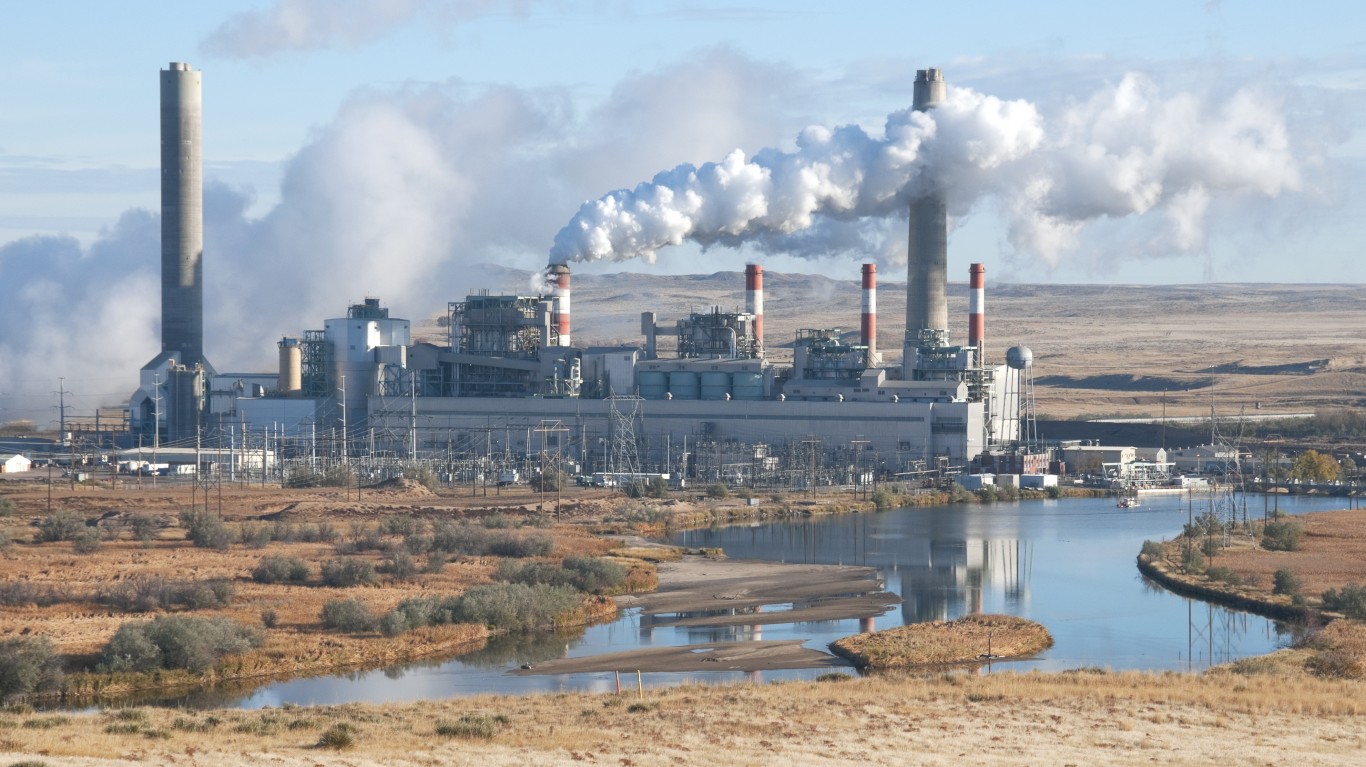
50. Wyoming
> 1-yr. change in energy-related carbon dioxide emissions: -1.9% (-1.0 million metric tons)
> 5-yr. change in energy-related carbon dioxide emissions: -13.1% (-8.2 million metric tons)
> Energy-related carbon dioxide emissions in 2021: 94.3 metric tons per person – the highest (54.6 million metric tons total)
> Energy-related carbon dioxide emissions in 2020: 96.2 metric tons per person – the highest (55.6 million metric tons total)
[in-text-ad]
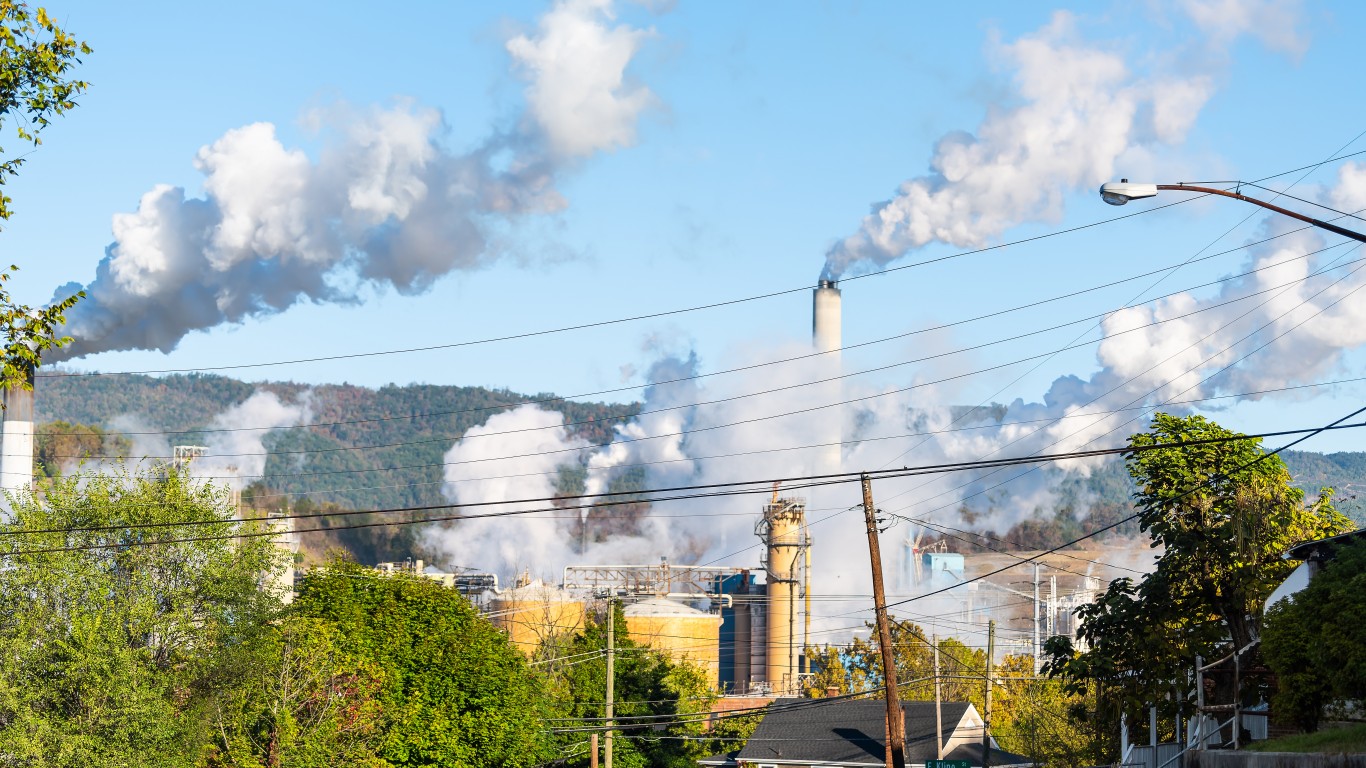
49. Virginia
> 1-yr. change in energy-related carbon dioxide emissions: -0.2% (-222,446 metric tons)
> 5-yr. change in energy-related carbon dioxide emissions: -7.2% (-7.6 million metric tons)
> Energy-related carbon dioxide emissions in 2021: 11.3 metric tons per person – 16th lowest (98.0 million metric tons total)
> Energy-related carbon dioxide emissions in 2020: 11.4 metric tons per person – 19th lowest (98.2 million metric tons total)

48. Mississippi
> 1-yr. change in energy-related carbon dioxide emissions: -0.2% (-98,052 metric tons)
> 5-yr. change in energy-related carbon dioxide emissions: +4.3% (+2.6 million metric tons)
> Energy-related carbon dioxide emissions in 2021: 21.4 metric tons per person – 15th highest (63.1 million metric tons total)
> Energy-related carbon dioxide emissions in 2020: 21.3 metric tons per person – 11th highest (63.2 million metric tons total)

47. South Dakota
> 1-yr. change in energy-related carbon dioxide emissions: +1.4% (+204,640 metric tons)
> 5-yr. change in energy-related carbon dioxide emissions: +3.4% (+500,422 metric tons)
> Energy-related carbon dioxide emissions in 2021: 16.9 metric tons per person – 20th highest (15.2 million metric tons total)
> Energy-related carbon dioxide emissions in 2020: 16.8 metric tons per person – 20th highest (15.0 million metric tons total)
[in-text-ad-2]

46. New Mexico
> 1-yr. change in energy-related carbon dioxide emissions: +1.5% (+675,752 metric tons)
> 5-yr. change in energy-related carbon dioxide emissions: -7.5% (-3.7 million metric tons)
> Energy-related carbon dioxide emissions in 2021: 21.7 metric tons per person – 13th highest (45.9 million metric tons total)
> Energy-related carbon dioxide emissions in 2020: 21.3 metric tons per person – 12th highest (45.2 million metric tons total)

45. Nebraska
> 1-yr. change in energy-related carbon dioxide emissions: +1.5% (+712,840 metric tons)
> 5-yr. change in energy-related carbon dioxide emissions: -1.4% (-649,832 metric tons)
> Energy-related carbon dioxide emissions in 2021: 24.0 metric tons per person – 9th highest (47.2 million metric tons total)
> Energy-related carbon dioxide emissions in 2020: 23.7 metric tons per person – 7th highest (46.5 million metric tons total)
[in-text-ad]

44. Oregon
> 1-yr. change in energy-related carbon dioxide emissions: +2.7% (+1.0 million metric tons)
> 5-yr. change in energy-related carbon dioxide emissions: -0.7% (-255,132 metric tons)
> Energy-related carbon dioxide emissions in 2021: 9.1 metric tons per person – 6th lowest (38.5 million metric tons total)
> Energy-related carbon dioxide emissions in 2020: 8.8 metric tons per person – 6th lowest (37.5 million metric tons total)

43. Vermont
> 1-yr. change in energy-related carbon dioxide emissions: +2.8% (+149,613 metric tons)
> 5-yr. change in energy-related carbon dioxide emissions: -4.4% (-258,736 metric tons)
> Energy-related carbon dioxide emissions in 2021: 8.6 metric tons per person – 5th lowest (5.6 million metric tons total)
> Energy-related carbon dioxide emissions in 2020: 8.4 metric tons per person – 5th lowest (5.4 million metric tons total)

42. Louisiana
> 1-yr. change in energy-related carbon dioxide emissions: +2.9% (+5.3 million metric tons)
> 5-yr. change in energy-related carbon dioxide emissions: -2.5% (-4.8 million metric tons)
> Energy-related carbon dioxide emissions in 2021: 40.8 metric tons per person – 5th highest (188.6 million metric tons total)
> Energy-related carbon dioxide emissions in 2020: 39.4 metric tons per person – 5th highest (183.3 million metric tons total)
[in-text-ad-2]

41. Kansas
> 1-yr. change in energy-related carbon dioxide emissions: +3.4% (+2.0 million metric tons)
> 5-yr. change in energy-related carbon dioxide emissions: +1.2% (+725,806 metric tons)
> Energy-related carbon dioxide emissions in 2021: 20.3 metric tons per person – 17th highest (59.8 million metric tons total)
> Energy-related carbon dioxide emissions in 2020: 19.7 metric tons per person – 15th highest (57.8 million metric tons total)
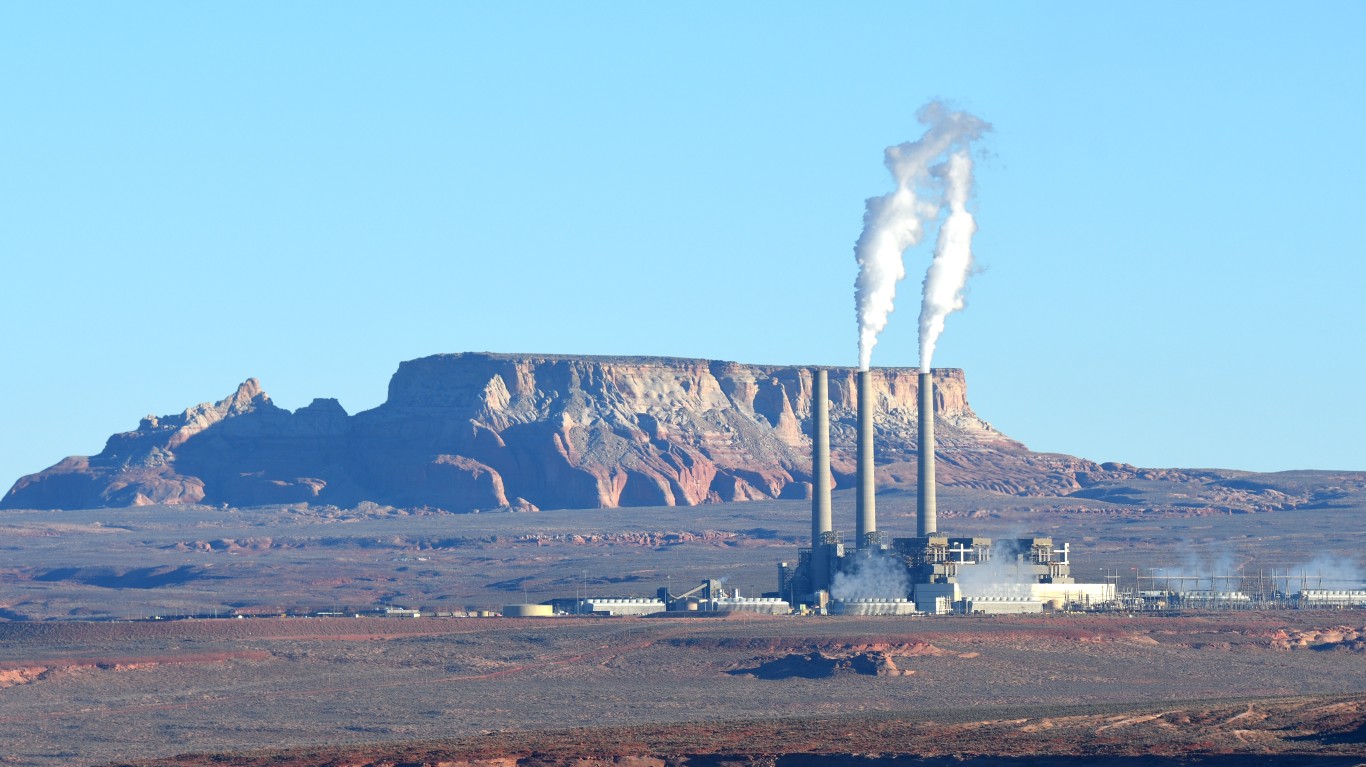
40. Arizona
> 1-yr. change in energy-related carbon dioxide emissions: +3.6% (+2.9 million metric tons)
> 5-yr. change in energy-related carbon dioxide emissions: -8.2% (-7.5 million metric tons)
> Energy-related carbon dioxide emissions in 2021: 11.4 metric tons per person – 17th lowest (83.0 million metric tons total)
> Energy-related carbon dioxide emissions in 2020: 11.2 metric tons per person – 18th lowest (80.2 million metric tons total)
[in-text-ad]
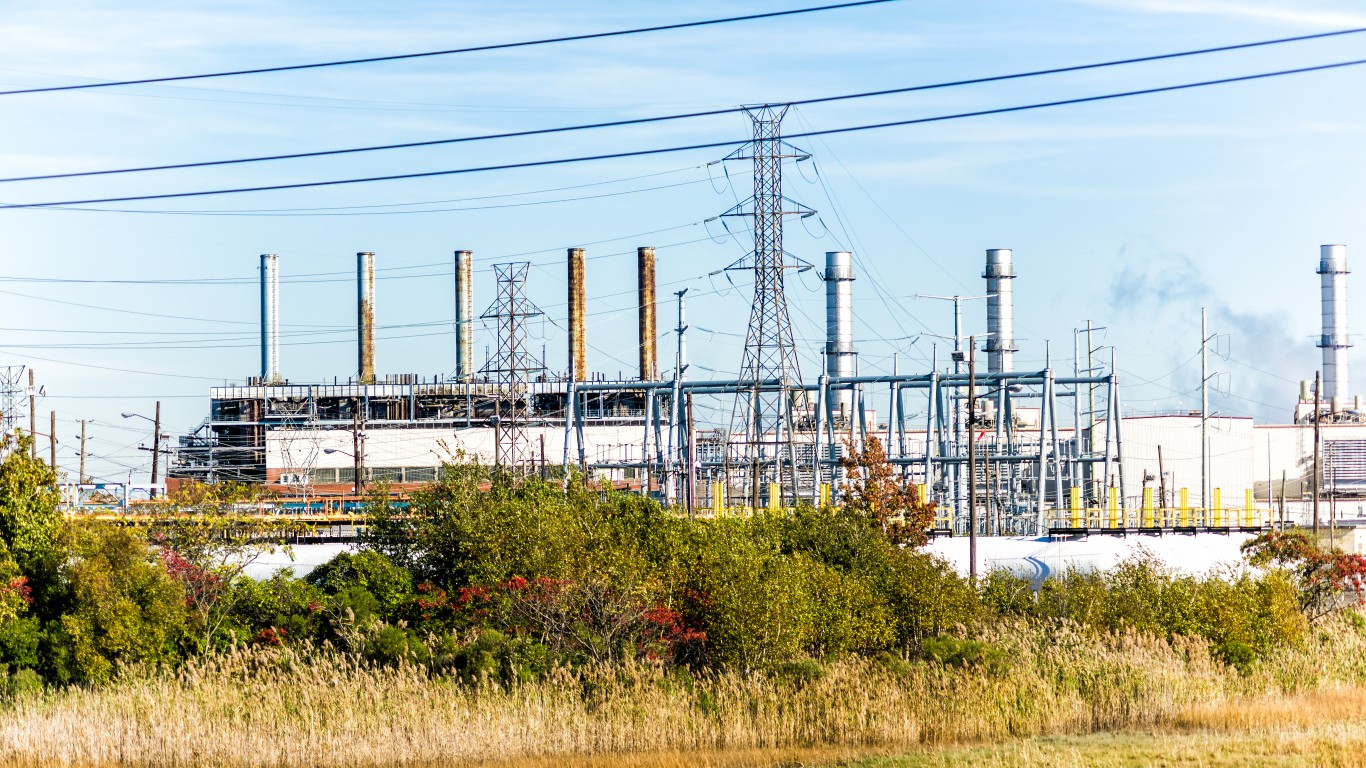
39. Delaware
> 1-yr. change in energy-related carbon dioxide emissions: +3.9% (+489,763 metric tons)
> 5-yr. change in energy-related carbon dioxide emissions: -5.8% (-802,128 metric tons)
> Energy-related carbon dioxide emissions in 2021: 12.9 metric tons per person – 21st lowest (13.0 million metric tons total)
> Energy-related carbon dioxide emissions in 2020: 12.6 metric tons per person – 23rd lowest (12.5 million metric tons total)

38. Oklahoma
> 1-yr. change in energy-related carbon dioxide emissions: +4.1% (+3.4 million metric tons)
> 5-yr. change in energy-related carbon dioxide emissions: -6.0% (-5.7 million metric tons)
> Energy-related carbon dioxide emissions in 2021: 22.0 metric tons per person – 12th highest (87.8 million metric tons total)
> Energy-related carbon dioxide emissions in 2020: 21.3 metric tons per person – 13th highest (84.4 million metric tons total)
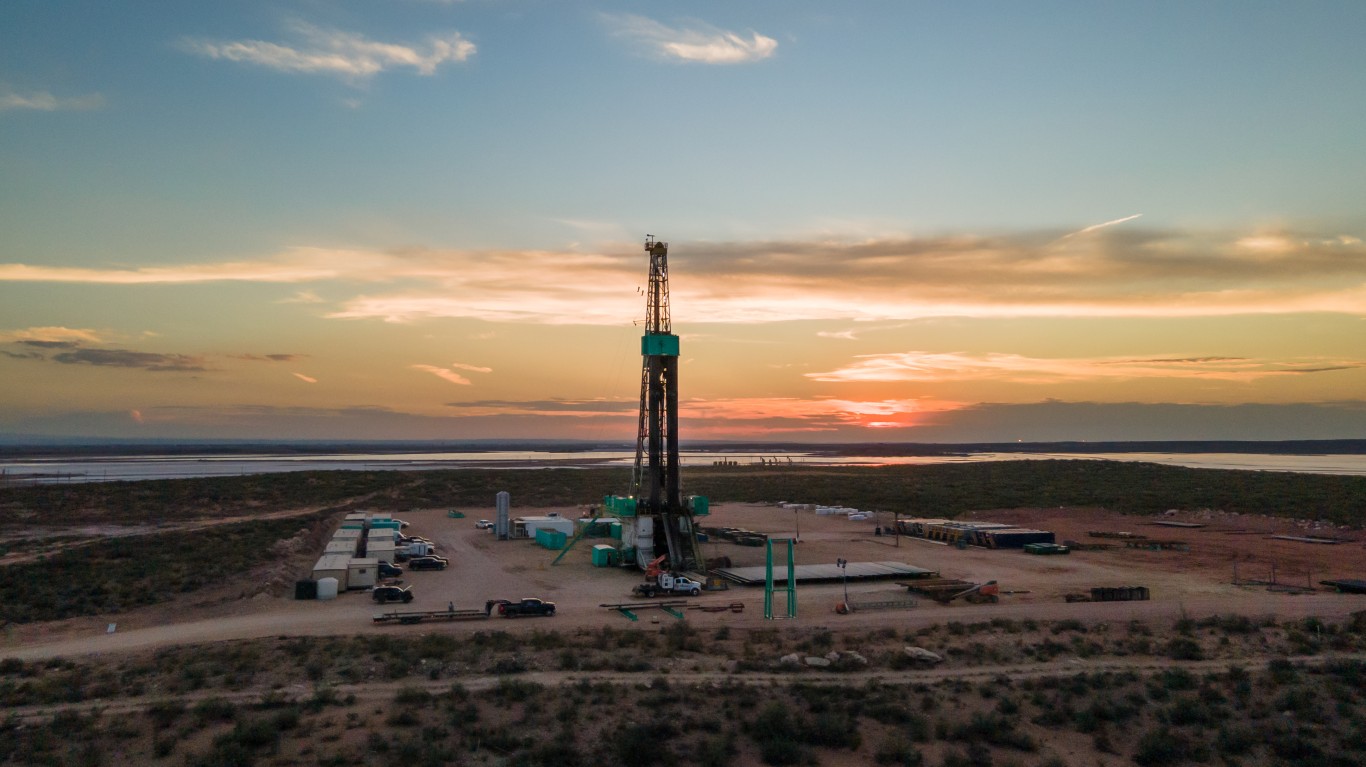
37. North Dakota
> 1-yr. change in energy-related carbon dioxide emissions: +4.2% (+2.3 million metric tons)
> 5-yr. change in energy-related carbon dioxide emissions: -0.7% (-382,006 metric tons)
> Energy-related carbon dioxide emissions in 2021: 72.7 metric tons per person – 2nd highest (56.5 million metric tons total)
> Energy-related carbon dioxide emissions in 2020: 69.6 metric tons per person – 2nd highest (54.3 million metric tons total)
[in-text-ad-2]

36. Ohio
> 1-yr. change in energy-related carbon dioxide emissions: +4.5% (+8.4 million metric tons)
> 5-yr. change in energy-related carbon dioxide emissions: -5.4% (-11.0 million metric tons)
> Energy-related carbon dioxide emissions in 2021: 16.5 metric tons per person – 21st highest (194.0 million metric tons total)
> Energy-related carbon dioxide emissions in 2020: 15.7 metric tons per person – 21st highest (185.7 million metric tons total)

35. Idaho
> 1-yr. change in energy-related carbon dioxide emissions: +6.0% (+1.2 million metric tons)
> 5-yr. change in energy-related carbon dioxide emissions: +9.7% (+1.8 million metric tons)
> Energy-related carbon dioxide emissions in 2021: 10.8 metric tons per person – 14th lowest (20.5 million metric tons total)
> Energy-related carbon dioxide emissions in 2020: 10.5 metric tons per person – 16th lowest (19.4 million metric tons total)
[in-text-ad]

34. Minnesota
> 1-yr. change in energy-related carbon dioxide emissions: +6.1% (+4.8 million metric tons)
> 5-yr. change in energy-related carbon dioxide emissions: -8.9% (-8.1 million metric tons)
> Energy-related carbon dioxide emissions in 2021: 14.6 metric tons per person – 25th lowest (83.2 million metric tons total)
> Energy-related carbon dioxide emissions in 2020: 13.7 metric tons per person – 25th highest (78.4 million metric tons total)

33. Texas
> 1-yr. change in energy-related carbon dioxide emissions: +6.2% (+38.8 million metric tons)
> 5-yr. change in energy-related carbon dioxide emissions: -0.2% (-1.6 million metric tons)
> Energy-related carbon dioxide emissions in 2021: 22.4 metric tons per person – 11th highest (663.5 million metric tons total)
> Energy-related carbon dioxide emissions in 2020: 21.4 metric tons per person – 10th highest (624.7 million metric tons total)

32. Wisconsin
> 1-yr. change in energy-related carbon dioxide emissions: +6.2% (+5.4 million metric tons)
> 5-yr. change in energy-related carbon dioxide emissions: -6.3% (-6.2 million metric tons)
> Energy-related carbon dioxide emissions in 2021: 15.7 metric tons per person – 23rd highest (92.5 million metric tons total)
> Energy-related carbon dioxide emissions in 2020: 14.8 metric tons per person – 23rd highest (87.0 million metric tons total)
[in-text-ad-2]

31. New Jersey
> 1-yr. change in energy-related carbon dioxide emissions: +6.3% (+5.3 million metric tons)
> 5-yr. change in energy-related carbon dioxide emissions: -10.3% (-10.2 million metric tons)
> Energy-related carbon dioxide emissions in 2021: 9.6 metric tons per person – 9th lowest (89.1 million metric tons total)
> Energy-related carbon dioxide emissions in 2020: 9.0 metric tons per person – 10th lowest (83.8 million metric tons total)

30. Georgia
> 1-yr. change in energy-related carbon dioxide emissions: +6.5% (+7.5 million metric tons)
> 5-yr. change in energy-related carbon dioxide emissions: -12.5% (-17.7 million metric tons)
> Energy-related carbon dioxide emissions in 2021: 11.5 metric tons per person – 18th lowest (124.1 million metric tons total)
> Energy-related carbon dioxide emissions in 2020: 10.9 metric tons per person – 17th lowest (116.6 million metric tons total)
[in-text-ad]

29. California
> 1-yr. change in energy-related carbon dioxide emissions: +6.7% (+20.2 million metric tons)
> 5-yr. change in energy-related carbon dioxide emissions: -9.1% (-32.5 million metric tons)
> Energy-related carbon dioxide emissions in 2021: 8.3 metric tons per person – 3rd lowest (324.0 million metric tons total)
> Energy-related carbon dioxide emissions in 2020: 7.7 metric tons per person – 3rd lowest (303.8 million metric tons total)

28. New Hampshire
> 1-yr. change in energy-related carbon dioxide emissions: +6.7% (+831,385 metric tons)
> 5-yr. change in energy-related carbon dioxide emissions: -1.6% (-222,708 metric tons)
> Energy-related carbon dioxide emissions in 2021: 9.6 metric tons per person – 8th lowest (13.3 million metric tons total)
> Energy-related carbon dioxide emissions in 2020: 9.0 metric tons per person – 9th lowest (12.5 million metric tons total)

27. Maine
> 1-yr. change in energy-related carbon dioxide emissions: +6.7% (+904,274 metric tons)
> 5-yr. change in energy-related carbon dioxide emissions: -6.3% (-969,048 metric tons)
> Energy-related carbon dioxide emissions in 2021: 10.5 metric tons per person – 13th lowest (14.4 million metric tons total)
> Energy-related carbon dioxide emissions in 2020: 9.9 metric tons per person – 13th lowest (13.5 million metric tons total)
[in-text-ad-2]
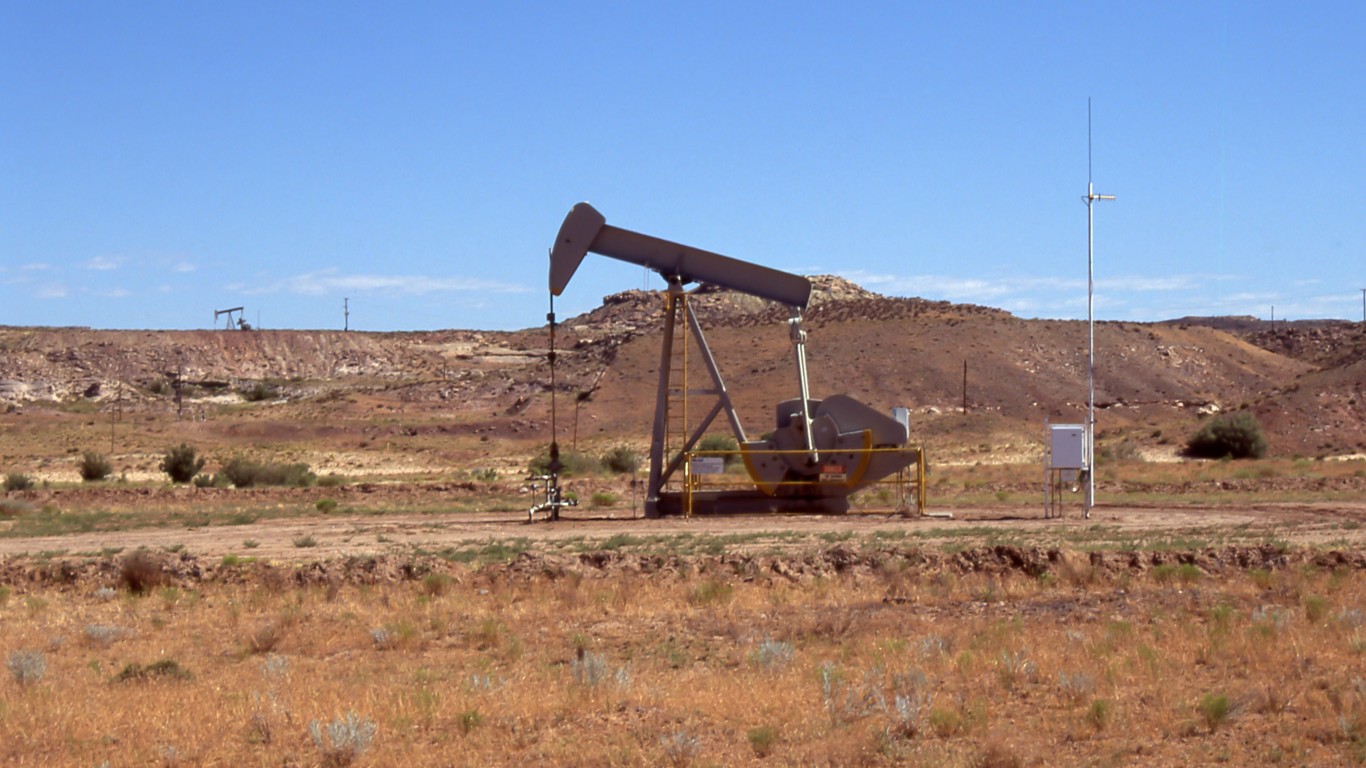
26. Colorado
> 1-yr. change in energy-related carbon dioxide emissions: +6.8% (+5.5 million metric tons)
> 5-yr. change in energy-related carbon dioxide emissions: -3.8% (-3.4 million metric tons)
> Energy-related carbon dioxide emissions in 2021: 14.7 metric tons per person – 25th highest (85.4 million metric tons total)
> Energy-related carbon dioxide emissions in 2020: 13.8 metric tons per person – 24th highest (79.9 million metric tons total)
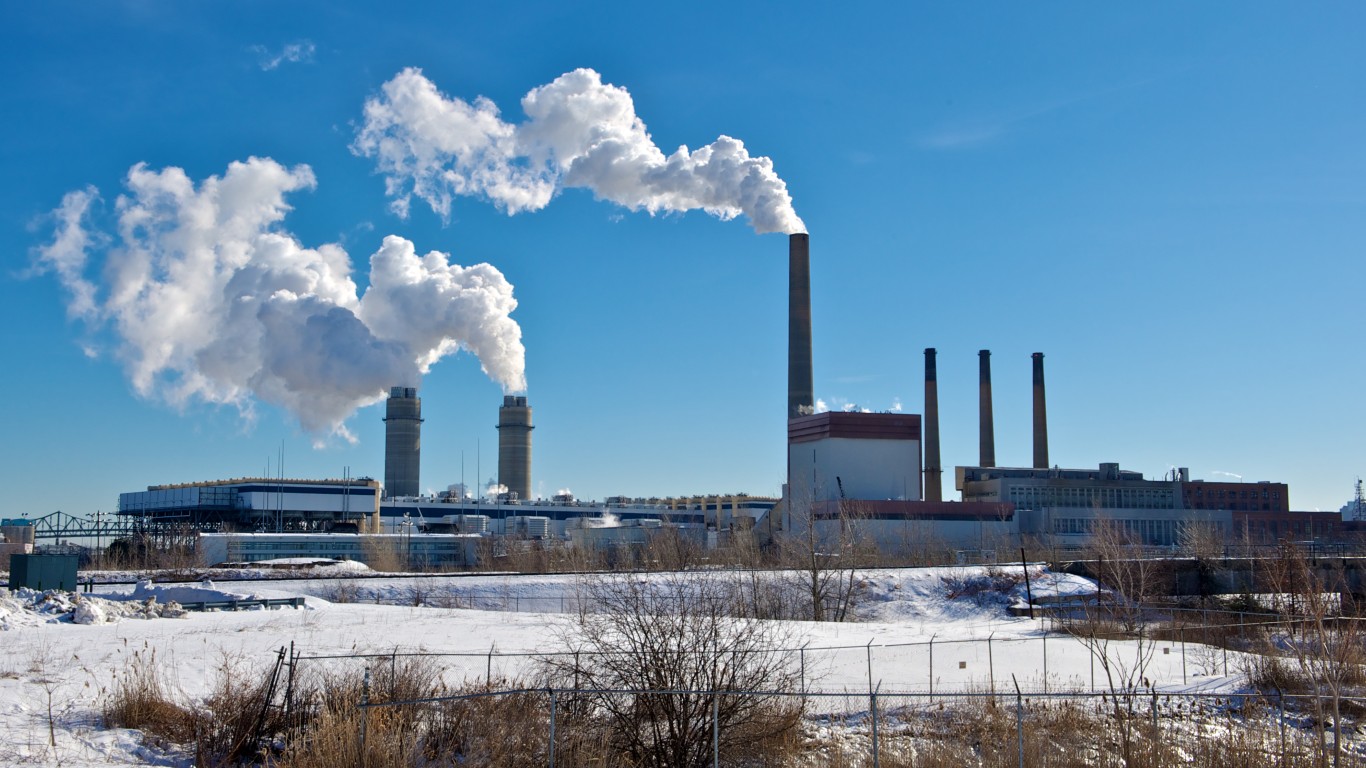
25. Massachusetts
> 1-yr. change in energy-related carbon dioxide emissions: +7.3% (+3.8 million metric tons)
> 5-yr. change in energy-related carbon dioxide emissions: -13.3% (-8.6 million metric tons)
> Energy-related carbon dioxide emissions in 2021: 8.0 metric tons per person – 2nd lowest (56.1 million metric tons total)
> Energy-related carbon dioxide emissions in 2020: 7.5 metric tons per person – 2nd lowest (52.3 million metric tons total)
[in-text-ad]

24. Missouri
> 1-yr. change in energy-related carbon dioxide emissions: +7.6% (+8.2 million metric tons)
> 5-yr. change in energy-related carbon dioxide emissions: -6.1% (-7.6 million metric tons)
> Energy-related carbon dioxide emissions in 2021: 19.0 metric tons per person – 18th highest (117.0 million metric tons total)
> Energy-related carbon dioxide emissions in 2020: 17.7 metric tons per person – 18th highest (108.7 million metric tons total)

23. Indiana
> 1-yr. change in energy-related carbon dioxide emissions: +7.7% (+11.9 million metric tons)
> 5-yr. change in energy-related carbon dioxide emissions: -5.4% (-9.5 million metric tons)
> Energy-related carbon dioxide emissions in 2021: 24.4 metric tons per person – 8th highest (166.4 million metric tons total)
> Energy-related carbon dioxide emissions in 2020: 22.7 metric tons per person – 8th highest (154.4 million metric tons total)

22. Washington
> 1-yr. change in energy-related carbon dioxide emissions: +7.9% (+5.4 million metric tons)
> 5-yr. change in energy-related carbon dioxide emissions: -6.7% (-5.3 million metric tons)
> Energy-related carbon dioxide emissions in 2021: 9.5 metric tons per person – 7th lowest (73.8 million metric tons total)
> Energy-related carbon dioxide emissions in 2020: 8.9 metric tons per person – 7th lowest (68.4 million metric tons total)
[in-text-ad-2]

21. Michigan
> 1-yr. change in energy-related carbon dioxide emissions: +8.0% (+11.0 million metric tons)
> 5-yr. change in energy-related carbon dioxide emissions: -5.0% (-7.9 million metric tons)
> Energy-related carbon dioxide emissions in 2021: 14.7 metric tons per person – 24th highest (147.8 million metric tons total)
> Energy-related carbon dioxide emissions in 2020: 13.6 metric tons per person – 25th lowest (136.9 million metric tons total)

20. Alaska
> 1-yr. change in energy-related carbon dioxide emissions: +8.0% (+2.9 million metric tons)
> 5-yr. change in energy-related carbon dioxide emissions: +15.2% (+5.1 million metric tons)
> Energy-related carbon dioxide emissions in 2021: 53.0 metric tons per person – 3rd highest (38.9 million metric tons total)
> Energy-related carbon dioxide emissions in 2020: 49.1 metric tons per person – 3rd highest (36.0 million metric tons total)
[in-text-ad]

19. Utah
> 1-yr. change in energy-related carbon dioxide emissions: +8.1% (+4.7 million metric tons)
> 5-yr. change in energy-related carbon dioxide emissions: +5.1% (+3.0 million metric tons)
> Energy-related carbon dioxide emissions in 2021: 18.6 metric tons per person – 19th highest (62.1 million metric tons total)
> Energy-related carbon dioxide emissions in 2020: 17.5 metric tons per person – 19th highest (57.4 million metric tons total)
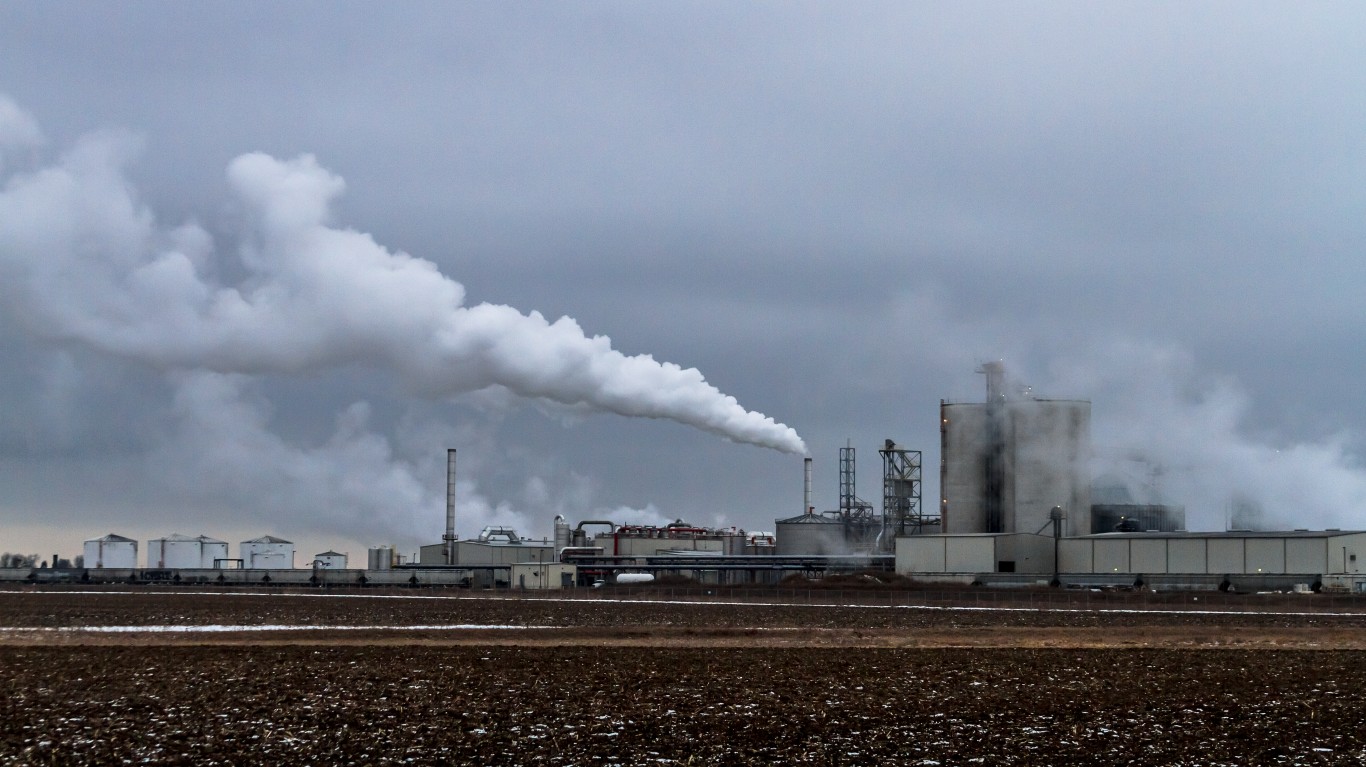
18. Illinois
> 1-yr. change in energy-related carbon dioxide emissions: +8.3% (+14.1 million metric tons)
> 5-yr. change in energy-related carbon dioxide emissions: -10.6% (-21.7 million metric tons)
> Energy-related carbon dioxide emissions in 2021: 14.5 metric tons per person – 24th lowest (184.2 million metric tons total)
> Energy-related carbon dioxide emissions in 2020: 13.3 metric tons per person – 24th lowest (170.2 million metric tons total)

17. Rhode Island
> 1-yr. change in energy-related carbon dioxide emissions: +8.3% (+815,845 metric tons)
> 5-yr. change in energy-related carbon dioxide emissions: +6.8% (+676,797 metric tons)
> Energy-related carbon dioxide emissions in 2021: 9.7 metric tons per person – 10th lowest (10.6 million metric tons total)
> Energy-related carbon dioxide emissions in 2020: 9.0 metric tons per person – 8th lowest (9.8 million metric tons total)
[in-text-ad-2]

16. Connecticut
> 1-yr. change in energy-related carbon dioxide emissions: +8.3% (+2.8 million metric tons)
> 5-yr. change in energy-related carbon dioxide emissions: +8.0% (+2.7 million metric tons)
> Energy-related carbon dioxide emissions in 2021: 10.1 metric tons per person – 11th lowest (36.6 million metric tons total)
> Energy-related carbon dioxide emissions in 2020: 9.4 metric tons per person – 11th lowest (33.8 million metric tons total)

15. North Carolina
> 1-yr. change in energy-related carbon dioxide emissions: +8.4% (+9.0 million metric tons)
> 5-yr. change in energy-related carbon dioxide emissions: -4.6% (-5.6 million metric tons)
> Energy-related carbon dioxide emissions in 2021: 10.9 metric tons per person – 15th lowest (115.6 million metric tons total)
> Energy-related carbon dioxide emissions in 2020: 10.2 metric tons per person – 14th lowest (106.6 million metric tons total)
[in-text-ad]
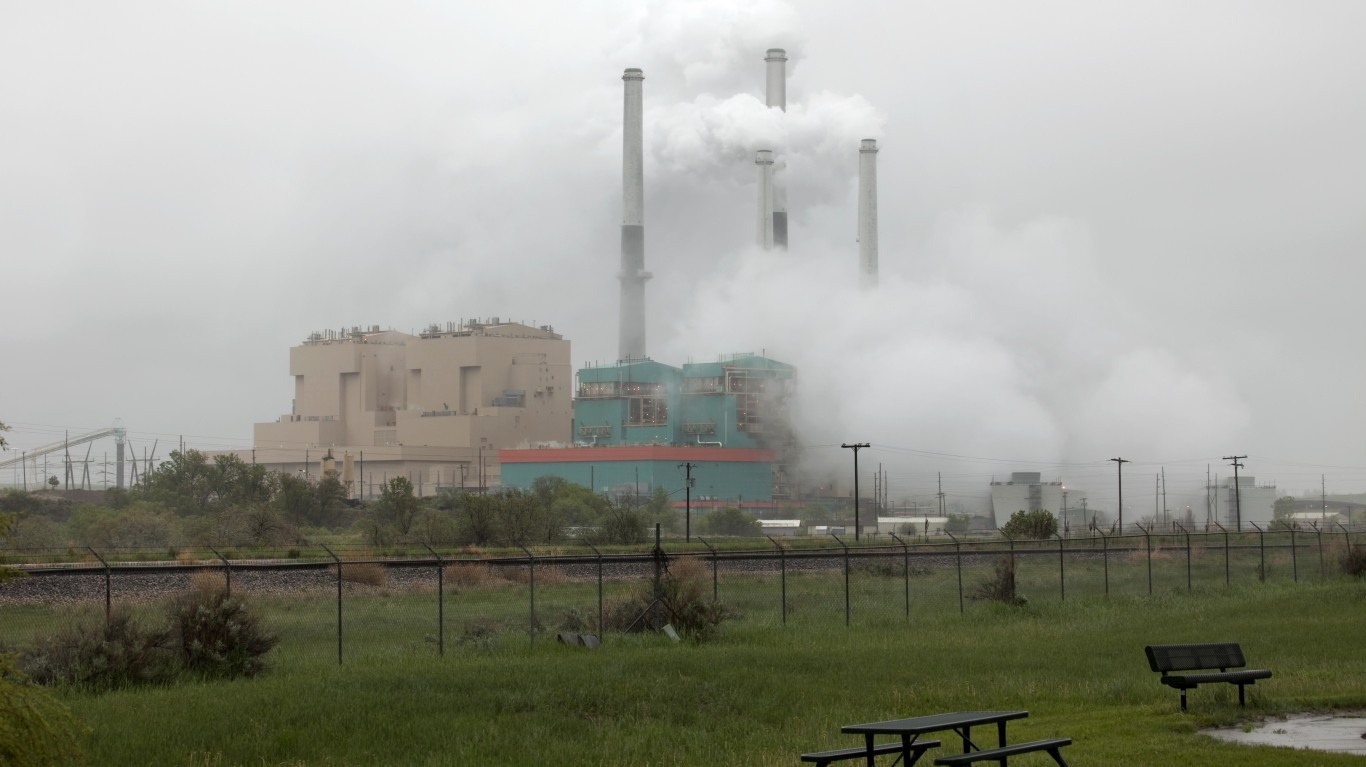
14. Montana
> 1-yr. change in energy-related carbon dioxide emissions: +8.5% (+2.2 million metric tons)
> 5-yr. change in energy-related carbon dioxide emissions: -8.7% (-2.7 million metric tons)
> Energy-related carbon dioxide emissions in 2021: 25.8 metric tons per person – 6th highest (28.5 million metric tons total)
> Energy-related carbon dioxide emissions in 2020: 24.2 metric tons per person – 6th highest (26.3 million metric tons total)

13. New York
> 1-yr. change in energy-related carbon dioxide emissions: +8.8% (+12.6 million metric tons)
> 5-yr. change in energy-related carbon dioxide emissions: -5.9% (-9.8 million metric tons)
> Energy-related carbon dioxide emissions in 2021: 7.9 metric tons per person – the lowest (156.0 million metric tons total)
> Energy-related carbon dioxide emissions in 2020: 7.1 metric tons per person – the lowest (143.4 million metric tons total)
12. Nevada
> 1-yr. change in energy-related carbon dioxide emissions: +8.9% (+3.2 million metric tons)
> 5-yr. change in energy-related carbon dioxide emissions: -1.9% (-782,687 metric tons)
> Energy-related carbon dioxide emissions in 2021: 12.5 metric tons per person – 20th lowest (39.4 million metric tons total)
> Energy-related carbon dioxide emissions in 2020: 11.6 metric tons per person – 20th lowest (36.2 million metric tons total)
[in-text-ad-2]

11. Florida
> 1-yr. change in energy-related carbon dioxide emissions: +9.0% (+18.6 million metric tons)
> 5-yr. change in energy-related carbon dioxide emissions: -5.1% (-12.1 million metric tons)
> Energy-related carbon dioxide emissions in 2021: 10.4 metric tons per person – 12th lowest (226.3 million metric tons total)
> Energy-related carbon dioxide emissions in 2020: 9.6 metric tons per person – 12th lowest (207.7 million metric tons total)

10. South Carolina
> 1-yr. change in energy-related carbon dioxide emissions: +9.1% (+5.8 million metric tons)
> 5-yr. change in energy-related carbon dioxide emissions: -0.9% (-625,075 metric tons)
> Energy-related carbon dioxide emissions in 2021: 13.4 metric tons per person – 23rd lowest (69.3 million metric tons total)
> Energy-related carbon dioxide emissions in 2020: 12.4 metric tons per person – 22nd lowest (63.6 million metric tons total)
[in-text-ad]

9. Maryland
> 1-yr. change in energy-related carbon dioxide emissions: +9.3% (+4.5 million metric tons)
> 5-yr. change in energy-related carbon dioxide emissions: -4.5% (-2.5 million metric tons)
> Energy-related carbon dioxide emissions in 2021: 8.5 metric tons per person – 4th lowest (52.6 million metric tons total)
> Energy-related carbon dioxide emissions in 2020: 7.8 metric tons per person – 4th lowest (48.1 million metric tons total)

8. Kentucky
> 1-yr. change in energy-related carbon dioxide emissions: +10.0% (+10.1 million metric tons)
> 5-yr. change in energy-related carbon dioxide emissions: -4.7% (-5.5 million metric tons)
> Energy-related carbon dioxide emissions in 2021: 24.7 metric tons per person – 7th highest (111.3 million metric tons total)
> Energy-related carbon dioxide emissions in 2020: 22.4 metric tons per person – 9th highest (101.2 million metric tons total)

7. Alabama
> 1-yr. change in energy-related carbon dioxide emissions: +10.1% (+10.0 million metric tons)
> 5-yr. change in energy-related carbon dioxide emissions: -0.2% (-202,453 metric tons)
> Energy-related carbon dioxide emissions in 2021: 21.5 metric tons per person – 14th highest (108.4 million metric tons total)
> Energy-related carbon dioxide emissions in 2020: 19.6 metric tons per person – 16th highest (98.4 million metric tons total)
[in-text-ad-2]

6. Pennsylvania
> 1-yr. change in energy-related carbon dioxide emissions: +10.5% (+20.2 million metric tons)
> 5-yr. change in energy-related carbon dioxide emissions: -0.8% (-1.8 million metric tons)
> Energy-related carbon dioxide emissions in 2021: 16.4 metric tons per person – 22nd highest (213.5 million metric tons total)
> Energy-related carbon dioxide emissions in 2020: 14.9 metric tons per person – 22nd highest (193.3 million metric tons total)
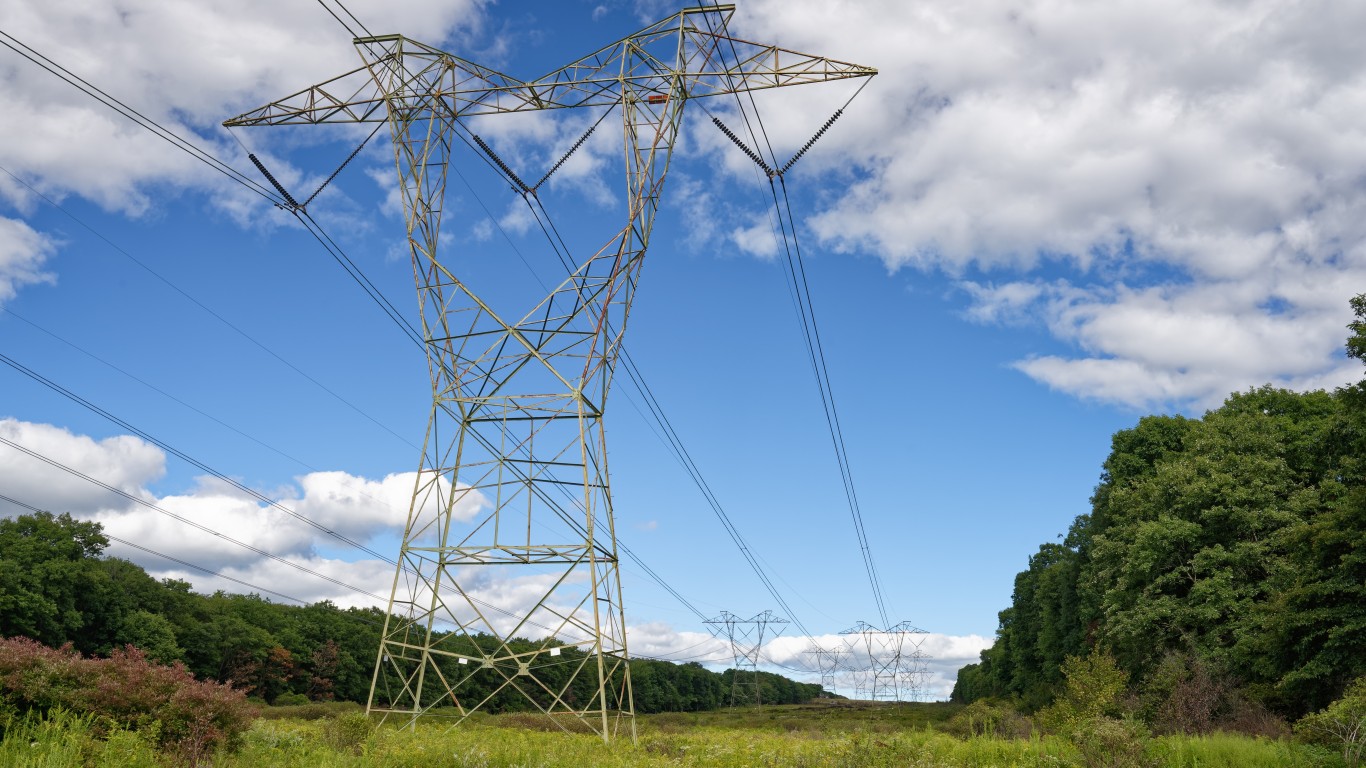
5. Tennessee
> 1-yr. change in energy-related carbon dioxide emissions: +11.2% (+9.4 million metric tons)
> 5-yr. change in energy-related carbon dioxide emissions: -4.9% (-4.7 million metric tons)
> Energy-related carbon dioxide emissions in 2021: 13.3 metric tons per person – 22nd lowest (92.7 million metric tons total)
> Energy-related carbon dioxide emissions in 2020: 12.0 metric tons per person – 21st lowest (83.3 million metric tons total)
[in-text-ad]
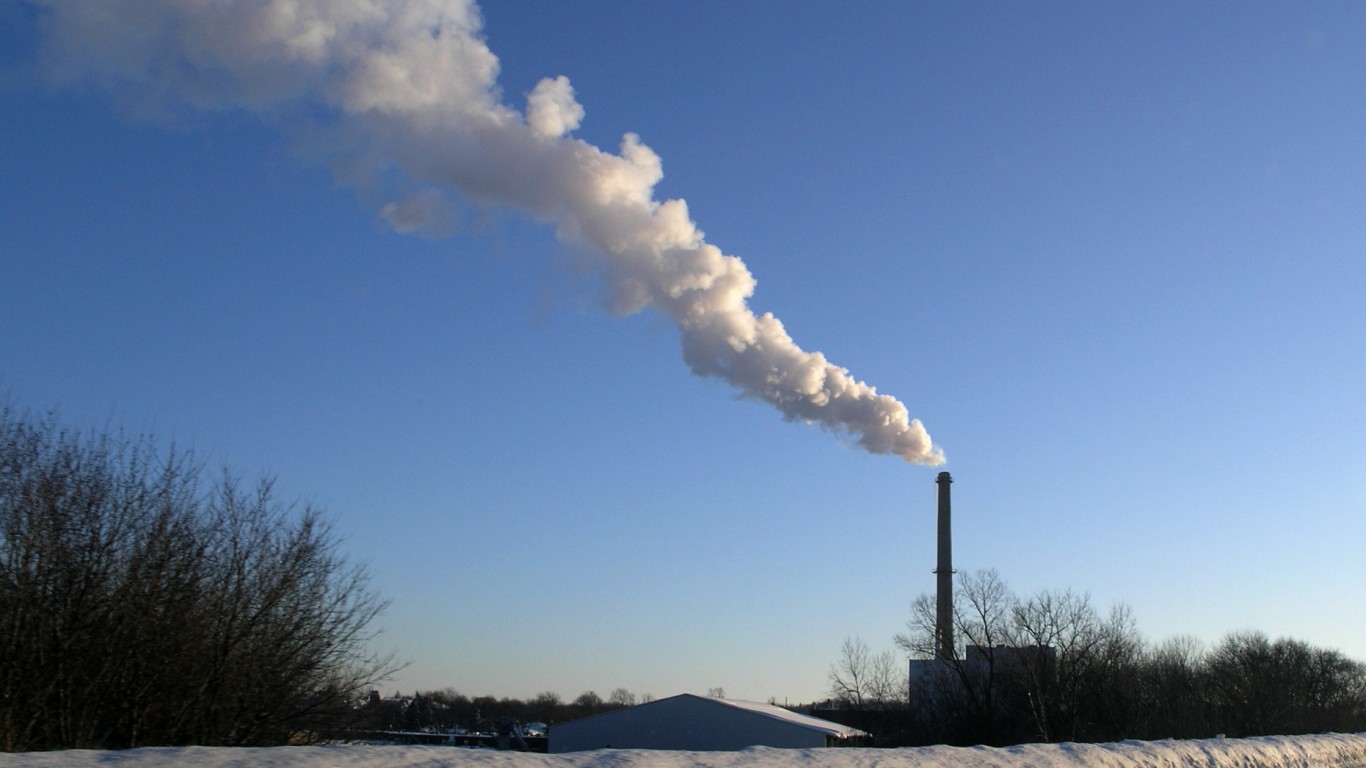
4. Iowa
> 1-yr. change in energy-related carbon dioxide emissions: +11.4% (+7.5 million metric tons)
> 5-yr. change in energy-related carbon dioxide emissions: -4.1% (-3.2 million metric tons)
> Energy-related carbon dioxide emissions in 2021: 22.9 metric tons per person – 10th highest (73.1 million metric tons total)
> Energy-related carbon dioxide emissions in 2020: 20.6 metric tons per person – 14th highest (65.7 million metric tons total)

3. Arkansas
> 1-yr. change in energy-related carbon dioxide emissions: +13.3% (+7.3 million metric tons)
> 5-yr. change in energy-related carbon dioxide emissions: -3.4% (-2.2 million metric tons)
> Energy-related carbon dioxide emissions in 2021: 20.5 metric tons per person – 16th highest (62.0 million metric tons total)
> Energy-related carbon dioxide emissions in 2020: 18.2 metric tons per person – 17th highest (54.7 million metric tons total)
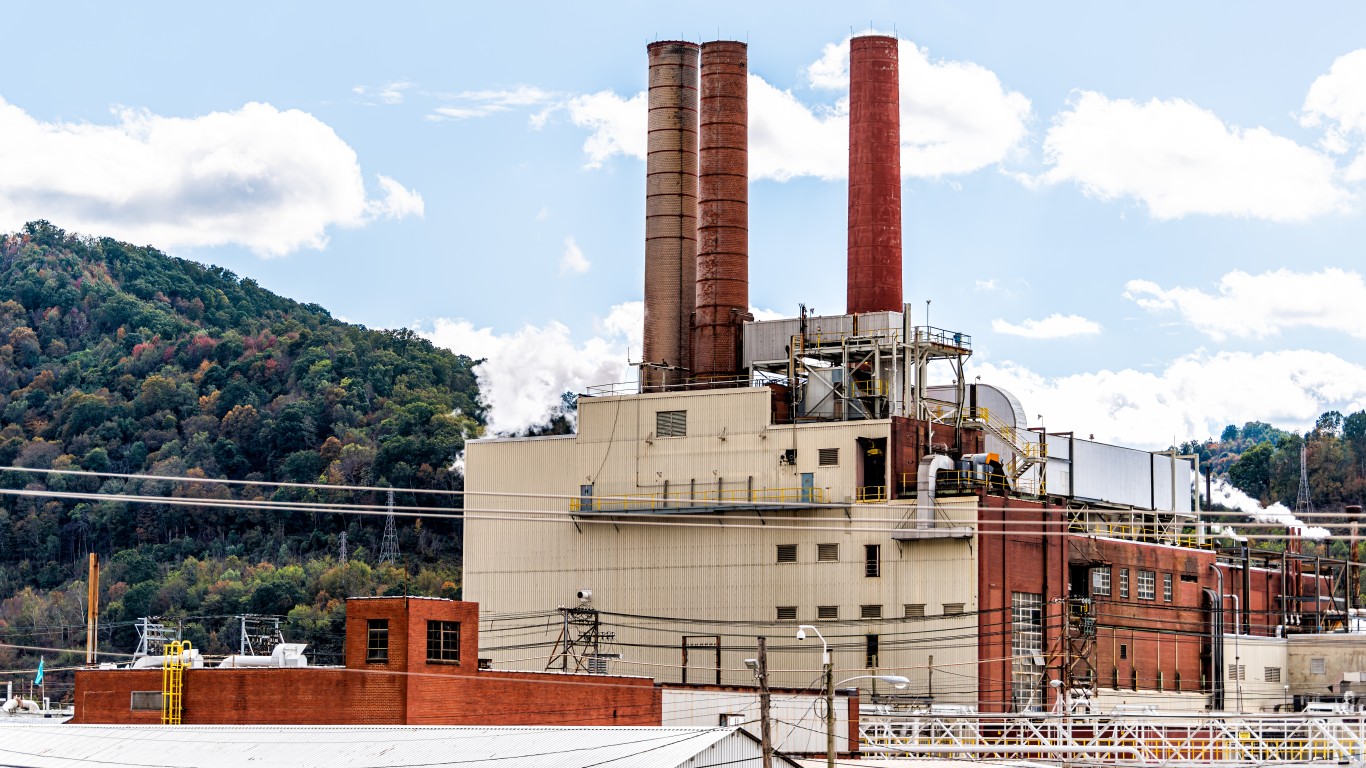
2. West Virginia
> 1-yr. change in energy-related carbon dioxide emissions: +14.9% (+11.5 million metric tons)
> 5-yr. change in energy-related carbon dioxide emissions: -2.7% (-2.4 million metric tons)
> Energy-related carbon dioxide emissions in 2021: 49.5 metric tons per person – 4th highest (88.4 million metric tons total)
> Energy-related carbon dioxide emissions in 2020: 43.0 metric tons per person – 4th highest (76.9 million metric tons total)
[in-text-ad-2]

1. Hawaii
> 1-yr. change in energy-related carbon dioxide emissions: +16.2% (+2.4 million metric tons)
> 5-yr. change in energy-related carbon dioxide emissions: -15.1% (-3.1 million metric tons)
> Energy-related carbon dioxide emissions in 2021: 12.0 metric tons per person – 19th lowest (17.3 million metric tons total)
> Energy-related carbon dioxide emissions in 2020: 10.3 metric tons per person – 15th lowest (14.9 million metric tons total)
Methodology
To identify the states where carbon emissions are rising fastest, 24/7 Wall St. reviewed data from the U.S. Energy Information Administration, a division of the Department of Energy. States are ranked on percent change in energy-related carbon dioxide emissions from 2020 to 2021.
We also reviewed five-year changes – 2017 to 2021 – in carbon emissions by state, though this longer term trend was not considered in the ranking.
Data on carbon emissions per capita is also from the Energy Information Administration.
The thought of burdening your family with a financial disaster is most Americans’ nightmare. However, recent studies show that over 100 million Americans still don’t have proper life insurance in the event they pass away.
Life insurance can bring peace of mind – ensuring your loved ones are safeguarded against unforeseen expenses and debts. With premiums often lower than expected and a variety of plans tailored to different life stages and health conditions, securing a policy is more accessible than ever.
A quick, no-obligation quote can provide valuable insight into what’s available and what might best suit your family’s needs. Life insurance is a simple step you can take today to help secure peace of mind for your loved ones tomorrow.
Click here to learn how to get a quote in just a few minutes.
Thank you for reading! Have some feedback for us?
Contact the 24/7 Wall St. editorial team.